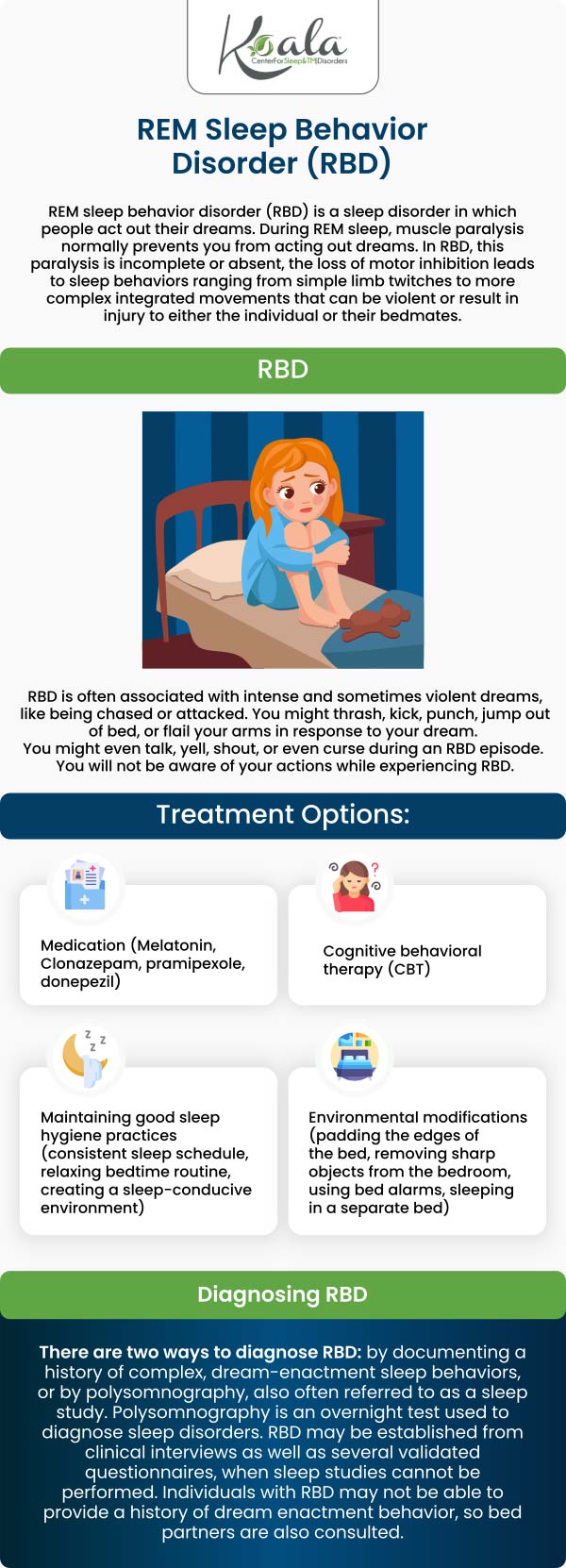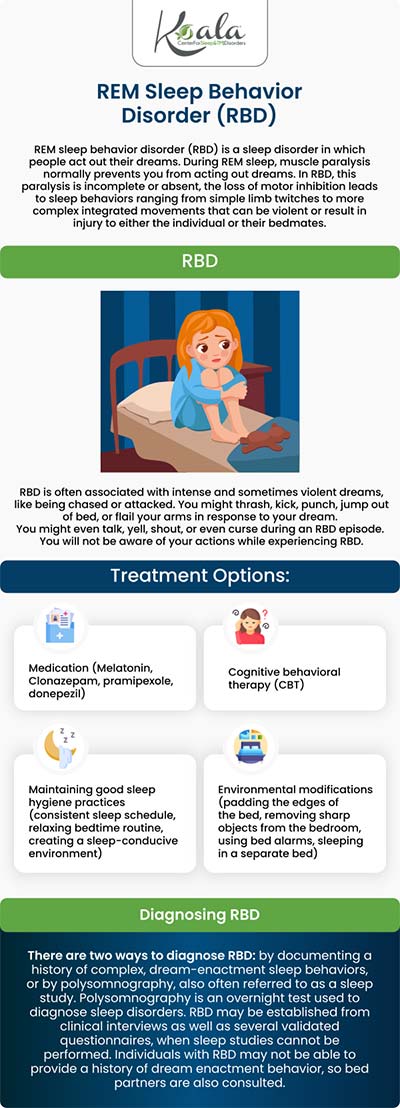Rapid Eye Movement Sleep Behavior Disorder
Rapid eye movement (REM) sleep behavior disorder is a condition where the individual physically acts out vivid, intense, and sometimes violent dreams, often resulting in physical actions such as punching, kicking, talking, yelling, sitting, or grabbing while sleeping. Untreated RBD can lead to immediate physical risks and long-term health issues, so it’s crucial to seek medical advice from Our professionals. Visit Koala® Center For Sleep & TMJ Disorders for a diagnosis and treatment. For more information, please contact us or book an appointment online now! We have convenient locations across the USA in Bloomington IL, Peoria/Dunlap IL, El Paso TX, and Wausau WI.




Table of Contents:
What are the signs of RBD?
How do you treat RBD?
Does RBD happen every night?
What happens if RBD is left untreated?
Sleep Behavior Disorder Treatment: Get Expert Help at Koala Sleep Centers
Rapid eye movement (REM) sleep behavior disorder, also known as RBD, is characterized by the physical acting out of dreams that are vivid, intense, and sometimes violent. Some of the key symptoms of this condition include punching, kicking, talking, yelling, sitting, or grabbing while sleeping. In addition, some people also express emotions such as laughter or crying during sleep. During an RBD episode, the dreamer may fall or jump out of bed.
In addition to physical movements and vocal expressions during sleep, individuals with RBD often have a high degree of dream recall, meaning they can describe their dreams in vivid detail. Dream recall is especially common when the dreamer is awoken or wakes spontaneously during an episode.
RBD episodes cause significant disruptions to sleep, leading to daytime fatigue, insomnia, and an increased risk of injury to oneself as well as bed partners. If you notice signs of RBD, it’s advised to book an appointment with a sleep expert to discuss your symptoms as well as strategies for managing them.
The primary goal of RBD treatment is to create a safe sleeping environment. Healthcare professionals recommend a variety of safety measures to ensure you don’t injure yourself or your bed partner during an episode. Some of the recommended safety measures include:
● Place a mattress on the floor or use padded bedside rails to prevent falls and injuries.
● Sleep in a sleeping bag to prevent flailing, kicking, or punching and injuring yourself or your bed partner.
● Place pillows between yourself and your surroundings, such as your headboard, nightstand, and bed partner.
● Move sharp or heavy objects away from your bed.
In addition, it’s recommended to avoid drinking alcohol, as it can worsen RBD symptoms. In severe cases of RBD, your doctor may recommend that you stop sharing a bed for both you and your bed partner’s safety.
Along with safety measures, your doctor may prescribe medication to alleviate your symptoms. While there aren’t any FDA-approved medications for RBD, healthcare professionals often use melatonin, clonazepam, and pramipexole to provide relief and minimize the frequency of episodes.
RBD episodes may or may not occur every night. The frequency of episodes can vary widely among those affected. While some people experience episodes every time they sleep, others have them less frequently. Factors that can influence the occurrence of RBD episodes include medication use, stress levels, sleep deprivation, and the presence of underlying health conditions, such as neurodegenerative diseases.
In addition, RBD episodes may occur several times during a sleeping period. People who have RBD are often unaware of their symptoms. Many patients only find out they have the condition after they get injured, or their bed partner or housemate informs them of their behavior. It’s important to consult a doctor if you suspect you may have RBD or another sleep disorder.
RBD can lead to injuries if it is left untreated. As the condition causes the person to flail, punch, kick, and roll around the bed, it is highly likely to result in an injury, whether it be the person experiencing the episode or their bed partner.
In addition to physical injury, untreated RBD can lead to significant sleep disturbances, resulting in daytime sleepiness and a negative effect on mood and general wellness. Furthermore, RBD is often a precursor to more severe neurodegenerative conditions, such as Parkinson’s disease, so it’s important to have your symptoms assessed by a doctor.
If left untreated, RBD not only poses immediate physical risks but can also have long-term health implications. If you suspect you may have RBD, it’s crucial to consult a healthcare professional. The experts at Koala® Center For Sleep & TMJ Disorders can provide comprehensive treatment for RBD by developing a personalized management plan to prevent the condition from significantly impacting your overall wellness.
At Koala Sleep Centers, we understand how disruptive and concerning a sleep behavior disorder can be for both you and your loved ones. Our goal is to provide expert treatment to help you regain control and sleep safely. We specialize in identifying the specific type of parasomnia you are experiencing, whether it’s sleepwalking, night terrors, or REM sleep behavior disorder. By getting to the root cause of the issue, we can create a personalized management plan that may include a custom oral appliance, medication, or behavioral therapies. Our compassionate team is here to guide you toward a solution that restores a peaceful and uninterrupted night’s sleep. Call us today to schedule your consultation with our providers.

Additional Services You May Need
▸ KoalaKIDZzz®
▸ Sleep Apnea
▸ Snoring
▸ TMJ Disorder
▸ Fatigue
▸ Sleep Disorders
▸ Weight Loss
▸ CPAP Alternative
▸ Oral Appliances




